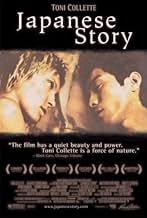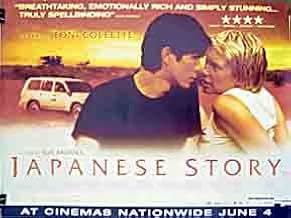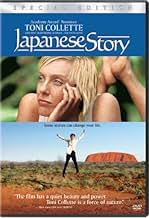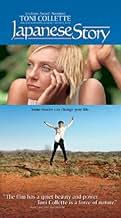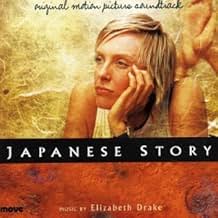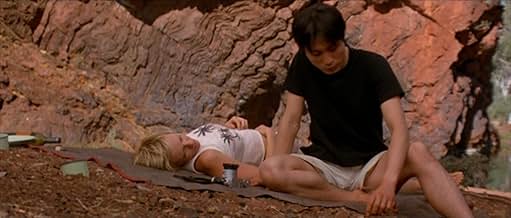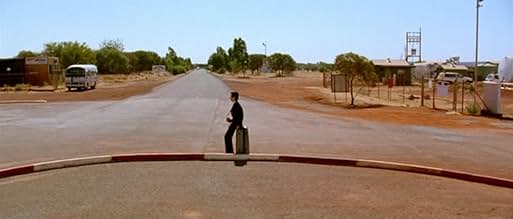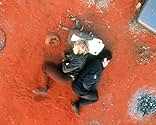PUNTUACIÓN EN IMDb
6,8/10
6,9 mil
TU PUNTUACIÓN
Sandy, una geóloga, se encuentra atrapada en un viaje de campo al desierto con Hiromitsu, un hombre japonés que considera arrogante Las cosas van de mal en peor cuando se quedan varados en u... Leer todoSandy, una geóloga, se encuentra atrapada en un viaje de campo al desierto con Hiromitsu, un hombre japonés que considera arrogante Las cosas van de mal en peor cuando se quedan varados en una de las regiones más remotas de la tierra.Sandy, una geóloga, se encuentra atrapada en un viaje de campo al desierto con Hiromitsu, un hombre japonés que considera arrogante Las cosas van de mal en peor cuando se quedan varados en una de las regiones más remotas de la tierra.
- Premios
- 20 premios y 13 nominaciones en total
Jules Hutchinson
- Canteen Worker
- (as Jules Hutchison)
Reseñas destacadas
10Adetunji
This is, apparently, a love it or hate it movie. As is the case with such films those on one side have a hard time understanding the view of the opposite. I am fully in that camp, I thought this film was stark and beautiful--as moving in its silence and mundane moments as it was illuminating. For those who say there is no plot, well I clearly saw a different film, there is more story and intention in simple small details as there are in a whole series of other films. Toni Collette was amazing and Gotaro Tsunashima was perfect, capturing the emotional compression and exploration of his character with clarity and skill. In a film full of striking absolutely believable and full moments -- the furtive exploratory glances as the two leads drive through the desert, and Toni's fascination with Gotaro's nearly hairless arms say so much about the characters', their history, their assumptions, their prejudices. Incredibly moving, shattering emotionally, and ultimately deeply profound. A haiku-like meditation on living and sharing--I loved it.
The best thing about `Japanese Story,' an Australian film directed by Sue Brooks and set almost entirely in the Outback, is its unpredictability. Just as you begin to think that the story, written by Alison Tilson, is headed in one particular direction, it does an amazing about-face and leads us down an entirely different, utterly unexpected narrative path.
The movie starts off as a fairly standard romantic comedy, involving two strangers who don't like each other very much yet who are forced to spend an inordinate amount of time together. Sandy is a geologist whose company, against her will and better judgment, has asked her to escort an important Japanese businessman through the wilds of the Australian desert on a sightseeing tour. The film even begins to seem a bit like a landlocked `Swept Away' for awhile, as these two headstrong people he a Japanese traditionalist with male chauvinistic tendencies and she a no-nonsense, freethinking, independent woman (but both filled with doubts and insecurities beneath the surface) find themselves stranded in a hostile and remote environment, fighting for survival. But then the first of the film's numerous plot reversals kicks in and we find ourselves in an entirely different situation altogether.
I certainly don't want to spoil anyone's experience of this film by revealing just what those plot twists are, so I will merely state that the film, in the second half, becomes a fairly profound meditation on the precarious nature of life and the almost lightning-paced speed with which tragedy can intervene to bring our worlds crashing down around us. Toni Collette is heartbreaking as the feisty yet warmhearted Sandy and Gotaro Tsunashima is both tender and stoic as the man from an exotic culture with whom she eventually falls in love.
That, of course, is the predictable part. But if you think you know where this story is going, you will be pleasantly surprised at how wrong you will be.
The movie starts off as a fairly standard romantic comedy, involving two strangers who don't like each other very much yet who are forced to spend an inordinate amount of time together. Sandy is a geologist whose company, against her will and better judgment, has asked her to escort an important Japanese businessman through the wilds of the Australian desert on a sightseeing tour. The film even begins to seem a bit like a landlocked `Swept Away' for awhile, as these two headstrong people he a Japanese traditionalist with male chauvinistic tendencies and she a no-nonsense, freethinking, independent woman (but both filled with doubts and insecurities beneath the surface) find themselves stranded in a hostile and remote environment, fighting for survival. But then the first of the film's numerous plot reversals kicks in and we find ourselves in an entirely different situation altogether.
I certainly don't want to spoil anyone's experience of this film by revealing just what those plot twists are, so I will merely state that the film, in the second half, becomes a fairly profound meditation on the precarious nature of life and the almost lightning-paced speed with which tragedy can intervene to bring our worlds crashing down around us. Toni Collette is heartbreaking as the feisty yet warmhearted Sandy and Gotaro Tsunashima is both tender and stoic as the man from an exotic culture with whom she eventually falls in love.
That, of course, is the predictable part. But if you think you know where this story is going, you will be pleasantly surprised at how wrong you will be.
8=G=
It would be impossible to say anything substantially meaningful about "Japanese Story" without spoiling the film for those who have not seen it. Suffice it to say, it's set in Australia and works with a an Aussie woman (Colette) and a Japanese man (Hiromitsu) to build slowly to an emotionally potent situation - a series of moments - and then lingers in the denouement allowing the audience to savor the emotions evoked. For some, those feelings may be nil. For others they may be powerful and overwhelming. Personally, I wept. Objectively, the film, about a woman by women, is well crafted and Colette's performance is outstanding. The film deserves high marks in all aspects from cinematography to music to casting, etc. However, when the closing credits roll, your experience will have been as unique as yourself. And whatever that experience is, it will be less if you know the outcome in advance. (B+)
Australia has given the cinema some wonderfully adept and strikingly effective female actors in the past twenty years or so, Judy Davis starting a parade that includes Nicole Kidman, Cate Blanchett and Toni Collett among others. Collett has the ability to convincingly inhabit many different roles, her part as the depressed, suicidal mom in "About a Boy" being one of her most memorable.
"Japanese Story" is a quirky tale about Sandy Edwards, Collette, an Australian geologist in her, I would guess, mid-thirties. She's ordered to squire about the son of a Japanese industrialist whose investment in a major project is dearly desired by her bosses. The young man, handicapped by a very poor grasp of English and virtually none of Australian, is played by Gotaro Tsunashima. He might be well known in his native country but he was a new screen presence for me.
Sandy takes him on a tour of an achingly eerie, desolate, windswept part of Western Australia. Must of the movie was filmed in the Pilbara Desert, still aborigine country.
Sandy and her charge encounter adventurous situations while, no surprise, a romance springs up. Why Sandy would be attracted to the younger gentleman is never explained and it really shouldn't have been. "Japanese Story" asks the viewer to simply accept that liaisons arise without any deep preliminary exposition of character.
I won't reveal the plot, somewhat unexpected, but fate insures that this affair doesn't proceed swimmingly. What makes the movie is Collette's superb and affecting acting. I cared about her while knowing relatively little about her character's past life other than she hasn't completely resolved mom-daughter issues.
Nothing in this film could impel me to ever wish to go to the Pilbara Desert but it does excite my desire to see Collette take on many more challenging roles. She has a strong future-I hope.
8/10. See it if it plays near you, rent it later if not. You won't be sorry.
"Japanese Story" is a quirky tale about Sandy Edwards, Collette, an Australian geologist in her, I would guess, mid-thirties. She's ordered to squire about the son of a Japanese industrialist whose investment in a major project is dearly desired by her bosses. The young man, handicapped by a very poor grasp of English and virtually none of Australian, is played by Gotaro Tsunashima. He might be well known in his native country but he was a new screen presence for me.
Sandy takes him on a tour of an achingly eerie, desolate, windswept part of Western Australia. Must of the movie was filmed in the Pilbara Desert, still aborigine country.
Sandy and her charge encounter adventurous situations while, no surprise, a romance springs up. Why Sandy would be attracted to the younger gentleman is never explained and it really shouldn't have been. "Japanese Story" asks the viewer to simply accept that liaisons arise without any deep preliminary exposition of character.
I won't reveal the plot, somewhat unexpected, but fate insures that this affair doesn't proceed swimmingly. What makes the movie is Collette's superb and affecting acting. I cared about her while knowing relatively little about her character's past life other than she hasn't completely resolved mom-daughter issues.
Nothing in this film could impel me to ever wish to go to the Pilbara Desert but it does excite my desire to see Collette take on many more challenging roles. She has a strong future-I hope.
8/10. See it if it plays near you, rent it later if not. You won't be sorry.
I think it's one of those memorable movies you'll think about for a long time, but it also seemed to go on for a long time while you're watching it. I think Americans aren't all that comfortable with the very leisurely pace of a lot of foreign films, and that may have been part of the problem -- but there's only so long you can watch someone expressing an emotion before you want to say "I get it, I get it -- can we move on to what happens next?" The plot involves a headstrong young Japanese businessman's visit to the most desolate part of Australia -- a rather tough geologist played by Toni Collette (Muriel's Wedding) is his tour guide. He doesn't quite understand how different Australia is from Japan, and Collette has her hands full trying to chauffeur him around. The movie centers around the relationship that develops between these two very different people, set in the mind-bogglingly desolate Australian outback.
If your idea of a great movie involves car chases, this is definitely not the movie for you. If you like slower and more nuanced movies, then this one is definitely worth seeing.
If your idea of a great movie involves car chases, this is definitely not the movie for you. If you like slower and more nuanced movies, then this one is definitely worth seeing.
¿Sabías que...?
- PifiasWhen the QANTAS jet to Kyoto leaves, it is actually leaving from the Perth domestic airport. The international terminal, where it would really leave from, and the Darling Ranges to the east, are clearly visible in the background.
- Créditos adicionalesOur thanks to the people of Nyamal, Ngarluma, Yinjibarndi, Bunjima and Nyiparli Nations.
- ConexionesFeatured in Inside Japanese Story: an evening with the film-makers (2004)
- Banda sonoraABC News Theme
(1986)
Written by Tony Ansell (as T. Ansell) and Peter Wall (as P. Wall)
Published by ABC Music Publishing and
Kindly reproduced with the permission of the Australian Broadcasting Corporation
Selecciones populares
Inicia sesión para calificar y añadir a tu lista para recibir recomendaciones personalizadas
- How long is Japanese Story?Con tecnología de Alexa
Detalles
- Fecha de lanzamiento
- País de origen
- Sitios oficiales
- Idiomas
- Títulos en diferentes países
- Японская история
- Localizaciones del rodaje
- Empresas productoras
- Ver más compañías en los créditos en IMDbPro
Taquilla
- Presupuesto
- 5.740.000 US$ (estimación)
- Recaudación en Estados Unidos y Canadá
- 647.054 US$
- Fin de semana de estreno en EE. UU. y Canadá
- 23.962 US$
- 4 ene 2004
- Recaudación en todo el mundo
- 4.098.613 US$
- Duración1 hora 46 minutos
- Color
- Mezcla de sonido
- Relación de aspecto
- 2.35 : 1
Contribuir a esta página
Sugerir un cambio o añadir el contenido que falta

Principal laguna de datos
What is the English language plot outline for Japanese Story (2003)?
Responde






